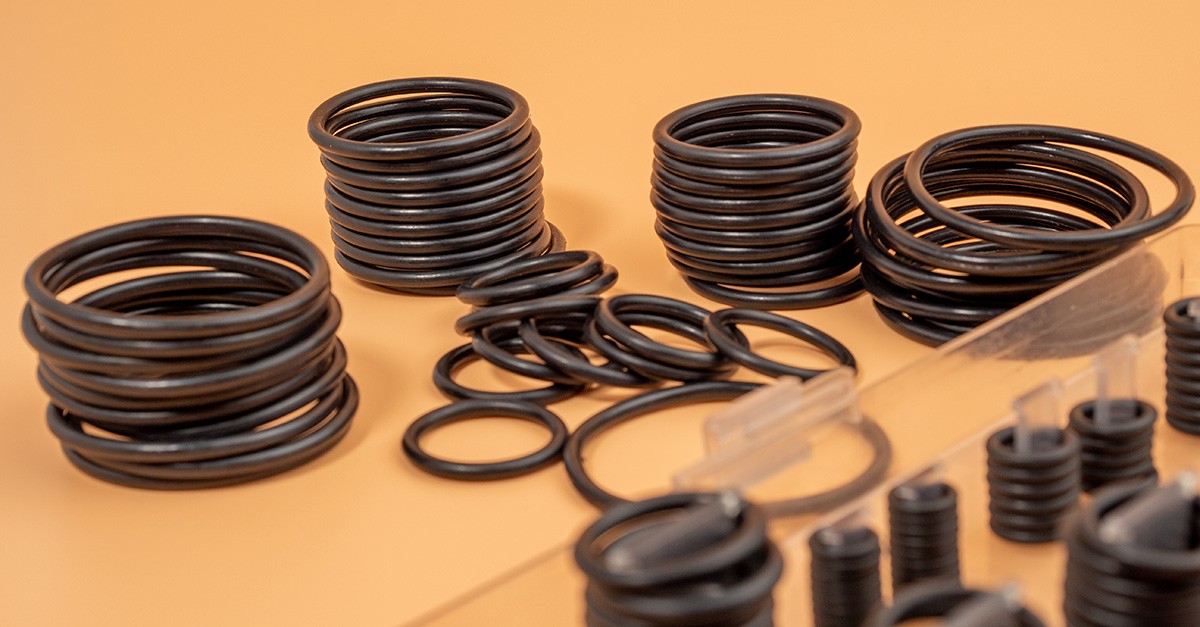
Ramén Valves, 27 June
How to choose the right sealing materials
When choosing material for your valve it is important to remember the valve elastomers, also known as valve seals or gaskets. They play a critical role in ensuring proper sealing and compatibility with different media. The selection of valve elastomers depends on the specific media being handled.
O-ring materials
Selecting the appropriate O-ring material is crucial when it comes to ensuring reliable and efficient valve operation in various process industries. The compatibility between the O-ring material and the media flowing through the valve is vital for preventing leakage, maintaining seal integrity, and prolonging the valve’s lifespan.
When specifying O-ring materials, consider the chemical compatibility, temperature range, and physical properties required for your specific application. FKM, EPDM, EPDM90SR, FFKM and Vitoflon are all excellent choices for different applications based on the media being handled.
Typical O-ring materials that we use and their suitable applications within different industries.
FKM (Fluorocarbon): FKM O-rings, also known as Viton® or Fluoroelastomer O-rings, offer excellent resistance to a wide range of aggressive chemicals, oils, fuels, and high temperatures. They are commonly used in demanding applications found in the chemical, oil and gas, and power plant industries. FKM O-rings are known for their exceptional chemical resistance, high-temperature stability, and low gas permeability, making them an ideal choice for valves handling harsh fluids or operating in extreme conditions.
EPDM (Ethylene Propylene Diene Monomer): EPDM O-rings are widely recognized for their superior resistance to water, steam, ozone, and weathering. These O-rings are commonly employed in applications where water or steam is the primary medium, such as water treatment plants, HVAC systems, and food and beverage processing. EPDM O-rings also provide good resistance to mild acids, alkalines, and polar solvents, making them suitable for certain chemical industry applications.
EPDM90SR (Sulfur-Cured EPDM): EPDM90SR O-rings are a modified form of EPDM that are specifically sulfur-cured to improve their resistance to high temperatures. These O-rings exhibit similar properties to EPDM but offer enhanced stability at elevated temperatures, making them suitable for applications where the valve may be exposed to steam or hot water. The EPDM90SR O-rings are commonly utilized in power plants, steam systems, and industrial boilers.
FFKM (Perfluoroelastomer): FFKM O-rings, also known as Perfluoroelastomer O-rings, are the most chemically resistant O-rings available. They can withstand aggressive chemicals, organic and inorganic acids, solvents, and even hot hydrocarbons. FFKM O-rings are typically used in extremely corrosive environments, such as the chemical processing, pharmaceutical, and semiconductor industries. Their exceptional chemical resistance and ability to maintain sealing performance under harsh conditions make them an excellent choice for critical applications.
Vitoflon (PTFE): Vitoflon O-rings, made from polytetrafluoroethylene (PTFE), offer exceptional resistance to a wide range of corrosive chemicals, high temperatures, and extreme pressures. These O-rings are commonly used in applications involving aggressive media, such as strong acids, bases, and solvents found in the chemical processing and pharmaceutical industries. Vitoflon O-rings provide excellent chemical resistance, low friction, and high thermal stability, making them an ideal choice for valves operating in demanding environments where exceptional sealing performance is required.
Seat materials
Selecting the appropriate seat material is crucial when it comes to ensuring reliable and efficient valve operation in various process industries. The seat material plays a vital role in providing effective sealing, minimizing leakage, and offering resistance to the specific media flowing through the valve.
When selecting seat materials, consider the compatibility with the specific media, temperature range, pressure conditions, and the required mechanical properties for your application. Reinforced PTFE, white PTFE, PEEK, and Stellite are all excellent choices for different applications based on the media being handled and the operating conditions.
Here are four common seat materials and their suitable applications within different industries.
Reinforced PTFE (Polytetrafluoroethylene): Reinforced PTFE seats are widely recognized for their excellent chemical resistance, low friction, and wide temperature range. They are commonly used in applications handling corrosive chemicals, acids, and strong bases found in the chemical processing industry. Reinforced PTFE seats offer exceptional resistance to a broad spectrum of aggressive media, ensuring reliable sealing and reduced risk of leakage.
White PTFE (Polytetrafluoroethylene): White PTFE seats, also known as virgin PTFE, provide excellent chemical resistance and low friction properties. They are suitable for applications involving food and beverage processing, pharmaceuticals, and other industries requiring compliance with strict hygiene standards. White PTFE seats are non-contaminating, non-toxic, and resistant to high temperatures, making them an ideal choice for valves handling sensitive or consumable media.
PEEK (Polyether Ether Ketone): PEEK seats offer exceptional mechanical strength, high-temperature resistance, and excellent chemical resistance to a wide range of aggressive media. They find applications in industries such as chemical processing, oil and gas, and power plants, where valves are exposed to high pressures, temperatures, and harsh chemicals. PEEK seats provide superior dimensional stability, prolonged service life, and reduced wear, ensuring reliable valve performance in demanding environments.
Stellite: Stellite seats are renowned for their exceptional hardness, wear resistance, and high-temperature performance. They are commonly used in applications involving severe conditions, such as mining, pulp and paper, and steel industries. Stellite seats exhibit excellent resistance to abrasive media, erosive fluids, and high-temperature environments, making them suitable for valves operating in challenging and abrasive process conditions.
Contact us if you need guidance in selecting the most suitable O-ring or seat material for your process requirements, ensuring reliable and efficient valve operation in your industry of choice.
